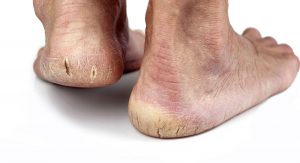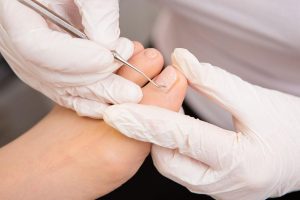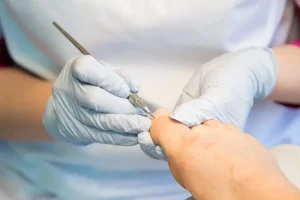Medical pedicure

Medical pedicure: Podology
With an average of 160,000 km walked in a lifetime, feet have earned the right to be pampered. However, even though our feet are our most important form of transportation, we still often neglect them in our daily hygiene routine. We pay much less attention to our feet than to the rest of our bodies and this often results in uncomfortable consequences such as itching, stinging and swelling as well as blisters, hard skin and fungus. In severe cases the skin splits and infections and open wounds appear.
Professional (cosmetic) training for foot care has been available for many years (through courses), with different approaches and techniques. The training of a medical podiatrist (chiropodist) however is legally controlled. Podiatrists work at a medical level and undergo a more extensive training (two years). Social Security services only cover some basic treatments, for diabetics for example.
Causes of foot problems
People with diabetes are prone to foot problems. Dry, rough, scaly skin is often the cause of mild complaints. However, over the years, when the control of blood sugar levels becomes more difficult and neurological problems start to appear, wounds and changes in temperature accentuate foot problems. Small cracks can then become easily infected.
Many foot problems are caused by an illness. People who are overweight, have rheumatism or liver disease, often complain of foot discomfort. On the other hand, one in three people has an untreated fungal infection which can easily spread to the nails. Also bad posture, as well as inadequate footwear, can cause pressure zones, hard skin, calluses, blisters and pain.


The podiatrist
Unfortunately, very few people go to see a medical specialist. The right professional to treat foot conditions is a podiatrist.
Unlike the cosmetic foot professional, who focuses on hygiene and appearance of the feet, the podiatrist has specific medical knowledge and works with the support of a mobile medical team. In this way the podiatrist and the doctor can advise and treat their patients together, constantly monitoring the medical history and detecting the evolution of possible risks in plenty of time.
A large proportion of patients suffer with their feet through diabetes – for them the visit to the podiatrist becomes absolutely essential. With age, diabetes also causes several eye disorders and the vision becomes progressively worse so that many patients do not even realise the changes that are occurring to their feet.
Diabetic peripheral neuropathy (damage to the nerves due to a high level of blood glucose in people with diabetes) further aggravates the situation with pain, tingling or numbness of the feet. This results in inflammation and wounds that are slow to heal – once again we reiterate the recommendation to go to a doctor and a podiatrist.
Medical care: The treatment
Podiatry aims to study the diseases and disorders affecting the foot. It covers subjects such as anatomy, microbiology and diabetes mellitus. The profession of podiatrist has been legally protected since 2002 and cannot be practised without the necessary two year degree. In Germany there are approximately 3,000 people with this degree. For professionals who already have at least five years of experience in the sector, there is a transitory regulation. Podiatrists are able to prescribe treatments.


The process of foot treatment
A podiatric treatment usually starts with a relaxing foot bath. Then the podiatrist will carefully examine each foot. Once the podiatrist gets an idea of the general condition of the feet he/she will look for inflammation, ulcers, open wounds, bruises, blisters, warts, hard skin, corns and ingrowing toenails and, if necessary, use special instruments for the treatment.
The podiatrist will even detect cases of fungi difficult to spot at a glance, and which are sometimes confused with dry skin. They will also inspect footwear and insoles. Finally they will provide valuable tips for daily hygiene of feet at home.
Prevention
Anyone who values the importance of having healthy feet can visit the podiatrist to get medical advice on daily foot care at home.
